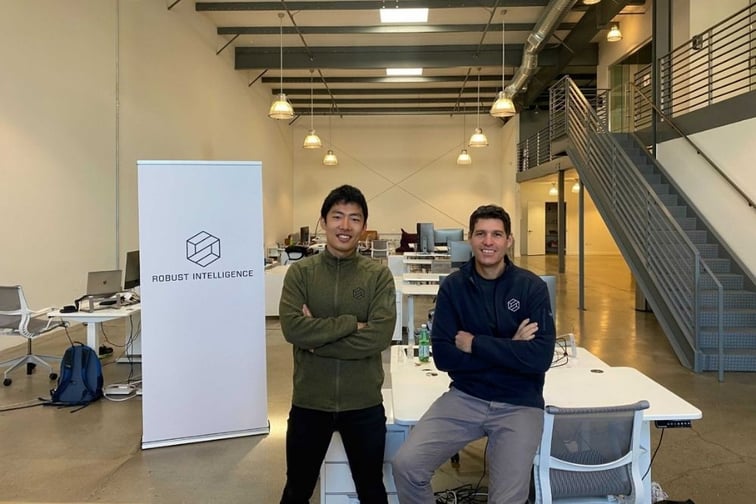

For some corporations, using an outside partner to weave new technology into their operations can take months of planning and execution.
Robust Intelligence believes its technology can be revved up in a much shorter time without much fuss. In its business alliance with Tokio Marine, a multinational carrier, Robust Intelligence is helping protect the Japanese market at this efficient rate, explained Yaron Singer, Robust’s CEO and co-founder.
“It takes a couple of people and the process takes about two hours,” Singer explained.
Robust is based in San Francisco and launched in 2019, founded by Harvard University academics Kojin Oshiba and Singer (pictured, left to right). The San Francisco-based insurtech describes itself as an “AI security and reliability start-up.” Translated, its AI-base helps sift out errors in other AI technology or related data models before they go into production and are used.
Customers come from industry areas including insurance, medical devices, cruise companies, genome analysis firms, travel industry outfits and neobanks (banks that operate online without traditional physical branch networks).
Approximately 50 people work for Robust, which has raised more than $45 million in venture capital financing to date.
Robust announced in May that it would partner with Tokio Marine with the idea of protecting its AI systems from “unintentional data input/contamination” that can lead to unexpected and incorrect results.
Masashi Namatame, Tokio Marine Group’s chief digital officer, noted in prepared remarks that the company uses AI in various business areas including claims services, product recommendations and customer support. He said the company is committed to working with Robust to manage corresponding AI risks and vulnerabilities “that are otherwise very hard to recognize.”
Together, the companies are also focusing on jointly researching and developing products to boost AI security. The deal calls for a broader look at AI security in the Japanese market and the global insurance industry.
In terms of the initial software partnership, Singer said there were productive discussions between the two partners, Robust and Tokio Marine, that preceded the signing of a production license before a few Robust engineers installing the software, and started the installation with Tokio Marine.
Engineers completed the initial process within about two hours, leaving the option to expand usage into other departments over time.
“One can basically create more and more instances of that software within the company to serve more teams,” Singer explained.
In the meanwhile, Robust offers customer support as needed.
“It’s completely out of the box,” Singer said.
“A lot of times integration costs are very high … there is a lot of back and forth, a lot of manual installation,” Singer said. “The product we’ve created is almost like zero integration. It’s very easy to use … and automates a lot of the processes that data scientists normally do and use.”
As Singer explains it, organizations using AI technology typically have data scientists on staff, with some focused on debugging models - checking models before they go into production and regularly assessing whether edits are needed. Robust’s software does that automatically.
“One of the biggest selling points for any company is the fact that we’re able to reduce that overhead from the data science teams,” Singer said. “We’re able to have the data science teams become 25% to 40% more effective because they no longer have to do these things.”
Employee take-up of the software is immediate, Singer said.
Software for offices and personal devices alike needs period technology updates, and the same thing is true with Robust.
“You always have to continue developing [and] look for more things,” Singer said.
That means identifying new AI-related threats or errors to check for, and then updating the technology accordingly. Singer said the company issues a new release every six weeks.
“Depending on the contract that we have with an organization, we make the updates available for customers if they wish,” he said.
As insurers and other industries keep turning to AI for at least some parts of their operations, demand could rise for companies such as Robust to help sift out errors those systems can unintentionally generate, Singer said.
“As more and more companies are relying on AI to help them automate decision-making, the risks increase,” Singer said, “there really needs to be testing as well as a safeguard right on these [AI] models, and that’s exactly what Robust Intelligence provides.”
